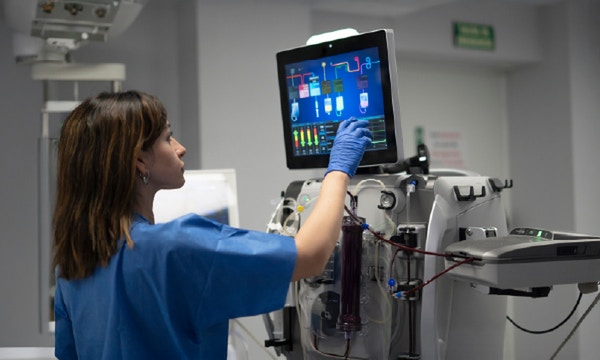The utility and innovation from using artificial intelligence in the Lifesciences and Healthcare (LSH) sector is growing rapidly.
From the discovery of drugs like Acinetobacter baumannii, finding the structure of the human proteome, to mindreading techniques used in Singapore and making a paraplegic patient walk just by making him think he could, AI is making everything possible in the LSH industry. And there are plenty more examples of AI wonders in the healthcare industry.
HCLTech understands its potential and is experimenting with new options such as combining AI with various other technologies — delivering comprehensive solutions, services, platforms and products — and helping customers reap the maximum benefit.
For example, HCLTech helped a leading sterilization equipment company that used an AI-powered service intelligence platform to gather sensor data in real time from across all its customer base and predict potential component failures.
“Besides predicting potential failures, these AI- and IoT-powered models also determine if a component requires replacement or service, thereby increasing efficiency and reducing just-in-time service,” says Partha Marella, Executive Vice President and Global Head of Medical Devices and Manufacturing segment at, HCLTech.
Generative AI in healthcare
AI is not always being used to solve complex issues or make a difficult discovery look easy. Often in the LSH industry, difficulties are faced by partnering organizations providing support to a hospital or a healthcare center.
For example, managing a huge database of patient details for a diagnostics company, facing difficulty in keeping a tab on medical devices and equipment that deal in clinical labs and replacing a manual pen-and-paper questionnaire filling that is tedious and time-consuming.
This is where conversational AI is gradually filling in for front-desk workers, receptionists and tele-callers, and making patient care simple. Fed with patients’ data and medical history, these large language models (LLMs) are getting intelligent day by day with quick and precise answers to people.
From providing customized health tips to diet advice to sharing reminder for medications, these chatbots are assisting people in need anytime, anywhere. Some of them have even gone a step further reducing anxiety and improving mental health.
But this is not restricted to just the patient. GenAI is also creating new opportunities for doctors, hospitals, medical devices providers, caregivers and many more in this industry.
For example, a prominent US-based medical devices and healthcare company that addresses a spectrum of healthcare needs, wanted to devise an effective and engaging solution to replace their previous offline premedical questionnaire process.
It looked forward to an AI-powered conversational agent (chatbot) that could engage with patients effectively with responses to queries and fill out the form based on the collected data automatically.
Addressing all the challenges presented by the client, HCLTech developed a GenAI-based agent using an LLM — similar to ChatGPT — for patient query understanding.
This agent is involved in identifying key premedical questions, patients’ voice inputs are transcribed into text with machine comprehension and conditional prompting finally generating domain-specific responses. The chatbot is also well-versed with conversion challenges and responses based on patients’ age, gender and speech-related difficulties (if any).
HCLTech helped the client with streamlining the premedical questionnaire process, eliminating manual form fill and freeing up its workers with a 40% time saving with the agent’s intervention.
Also, doctors gained valuable insights into patient health trends and patterns, enabling informed decision-making and they could decide on improved treatment strategies, ultimately improving patient outcomes.
Challenges and opportunities ahead
Chatbots may not always provide accurate answers due to insufficient data or differing patient cases. The data fed to a system may not be enough to answer critical questions asked by a patient. This is where more data varying from possibilities to expectation by a patient comes into act.
The way a chatbot is readied needs to be upgraded with data that matches a patient’s present case and not just include a similar case from the past. It also needs to be ready to answer the probable questions that can come up during a conversation. For example, how to eliminate fear of undergoing a surgery in a critical condition or if the condition can be cured just by medicines.
This is where an LLM needs to be finetuned and supported by Natural Language Processing (NLP) to understand a patient’s query in detail and provide the right information in a way that is easy to understand keeping medical terms and complexity at bay.
Challenges can also relate to security of a patient’s data and if any hacker can get access to it and tamper with it, thereby making a chatbot provide wrong and biased information and answers to a patient and misguiding him/her, especially when the person is aged.
This is where zero-trust cybersecurity plays an important role in the healthcare industry and organizations related to it providing safety to its cloud computing, securing its IoT-connected devices and equipment and keeping patients’ information undisclosed to outside sources.
How can these chatbots be further utilized?
With its wide range of experience handling cloud and moving traditional operations to cloud, healthcare IoT and big data and analytics, HCLTech is the right choice of partner when it comes to healthcare organizations looking forward to embrace AI or its various forms, including implementing the chatbot examples shared above.
HCLTech Intelligent Operations combines deep industry expertise with transformational product design ideology to streamline healthcare workflow and operations.
It increases adherence to SLAs, KPIs, healthcare regulations and compliance, improve member and provider satisfaction, aid intelligent decisions through real-time insights. It also assesses process risks efficiently, preserve financial resources and maintain a patient-centric architecture.
For example, HCL iAutomate Healthcare Solution is an intelligent runbook automation solution that assists healthcare clients in deploying zero-touch automation for complex and aging infrastructure, while HCL ROAR Healthcare Solution is a robust computational engine that enables large and complex healthcare enterprises to automate the inventorying of configuration items and generate accurate billing.

 Listen to article
Listen to article



